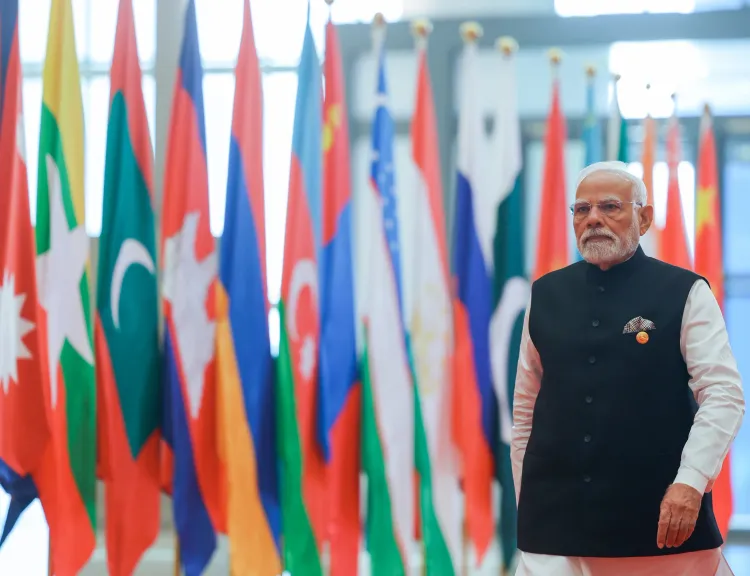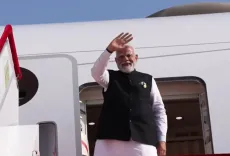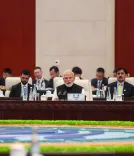Why Does India Maintain Its Firm Stance on China's Belt and Road Initiative?

Synopsis
Key Takeaways
- India remains the only SCO member not endorsing China's BRI.
- New Delhi emphasizes the importance of sovereignty and international norms.
- The Tianjin Declaration reflects member states' commitment to economic cooperation.
- India continues to oppose projects that threaten its territorial integrity.
- The SCO aims to enhance regional stability and economic governance.
Tianjin, September 1 (NationPress) On Monday, India reaffirmed its stance by once again declining to support China's controversial Belt and Road Initiative (BRI), positioning itself as the sole nation within the Shanghai Cooperation Organisation (SCO) to withhold endorsement of this project.
The Tianjin Declaration from the Council of Heads of State of the SCO declared, "The Republic of Belarus, the Islamic Republic of Iran, the Republic of Kazakhstan, the Kyrgyz Republic, the Islamic Republic of Pakistan, the Russian Federation, the Republic of Tajikistan, and the Republic of Uzbekistan, affirming their support for China's Belt and Road Initiative (BRI), acknowledged the ongoing collaborative efforts towards implementing this initiative, including the alignment of the Eurasian Economic Union with the BRI."
India has consistently opposed China's BRI in prior SCO Summits as well. New Delhi's stance regarding China’s ‘One Belt One Road’ (OBOR) or ‘Belt and Road Initiative’ (BRI) remains clear and unwavering.
The government, under the leadership of Prime Minister Narendra Modi, firmly believes that connectivity initiatives should adhere to universally accepted international standards, good governance, rule of law, openness, transparency, and equality, and should respect sovereignty and territorial integrity.
The Minister of State for External Affairs, Kirti Vardhan Singh, stated in Parliament earlier this year, "The government continues to assess the implications of the projects under OBOR/BRI on India’s sovereignty, territorial integrity, and security. We have persistently raised objections with the Chinese government regarding the inclusion of the so-called ‘China-Pakistan Economic Corridor’ (CPEC), which traverses areas within the Indian Union Territories of Ladakh and Jammu & Kashmir that are illegally occupied by Pakistan, as a flagship project of ‘OBOR/BRI’ and have urged them to halt these activities."
In the Tianjin declaration, member states acknowledged the SCO region's importance in revitalizing the global economy, stabilizing global production and supply chains, and ensuring sustainable development. They expressed their support for the reform of global economic governance frameworks.
The joint declaration articulates, "Member states recognize the SCO region's role in reviving the global economy, maintaining stability in global supply chains, and advancing sustainable development. They endorse the enhancement and reform of global economic governance structures and commit to upholding an open, transparent, fair, inclusive, non-discriminatory, and multilateral trading system grounded in internationally recognized principles, promoting open global economic development, ensuring equitable market access, and providing special and differential treatment for developing nations. The Council of Heads of Member States of the SCO has adopted a statement in support of the multilateral trading system."
The SCO member states voiced their opposition to unilateral coercive measures, including economic ones. The joint declaration states, "Member states stand against unilateral coercive measures, including economic ones, that violate the UN Charter and international law, the principles and rules of the World Trade Organisation, harming international security interests, including food and energy security, negatively impacting the global economy, undermining fair competition, and obstructing international collaboration towards achieving the UN Sustainable Development Goals."
The member states reiterated their commitment to upholding the principles outlined in the UN Charter and the SCO Charter, as well as universally recognized international legal standards in their relations. They advocated for respecting the rights of nations to independently and democratically choose their socio-economic and political paths, emphasizing that mutual respect for sovereignty, independence, territorial integrity, equality, mutual benefit, non-interference in internal affairs, and the non-use of force are fundamental to sustainable international relations.
According to the joint declaration, "Reaffirming their commitment to the objectives and principles of the SCO Charter, the member states will continue to operate in alignment with the 'Shanghai spirit,' which encompasses mutual trust, mutual benefit, equality, mutual consultation, respect for cultural diversity, and the pursuit of common development, while deepening cooperation to enhance security, stability, and sustainable development in the SCO region. They adhere to a stance that avoids bloc politics and confrontational approaches in addressing international and regional developmental challenges. The member states emphasize that collaboration within the SCO can serve as the foundation for establishing an architecture of equal and indivisible security throughout Eurasia."
The SCO Summit is currently underway in Tianjin under China's Presidency. The SCO is a permanent intergovernmental international organization founded in Shanghai on June 15, 2001. Member states include China, Russia, India, Kazakhstan, Kyrgyzstan, Tajikistan, Pakistan, Uzbekistan, Iran, and Belarus. The SCO also has two observer states—Afghanistan and Mongolia—and 14 dialogue partners: Turkey, Kuwait, Azerbaijan, Armenia, Cambodia, Nepal, Sri Lanka, Saudi Arabia, Egypt, Qatar, Bahrain, The Maldives, Myanmar, and the United Arab Emirates.








